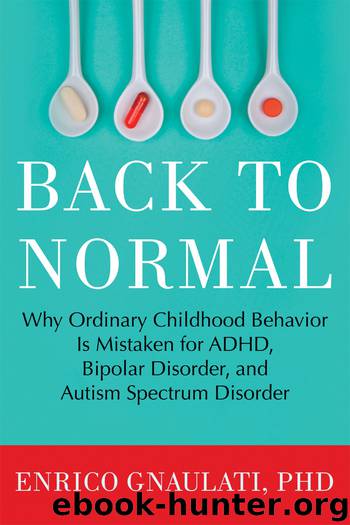Back to Normal: Why Ordinary Childhood Behavior Is Mistaken for ADHD, Bipolar Disorder, and Autism Spectrum Disorder by Enrico Gnaulati

Author:Enrico Gnaulati [Gnaulati, Enrico]
Language: eng
Format: epub
Tags: psychology, parenting
ISBN: 9780807073353
Google: VhmnRiMaaxgC
Publisher: Beacon Press
Published: 2013-09-17T04:00:00+00:00
FORGETFULNESS? OR WHAT’S-THE-POINT-OF-PRACTICING SYNDROME?
ADHD terminology has crept so completely into common parlance that I fully expect baby boomers heading into their twilight years to talk about “ADD moments” rather than “senior moments” when they misplace their keys. But not all moments of forgetfulness are due to ADD or to age-related cognitive decline. Forgetfulness can also be the outcome of resisting immersion in and repetitive exposure to subject matter—particularly if that subject matter holds little personal interest for an individual. If a kid spaces out all the time in history class and fails to remember that during George Washington’s presidency, for example, five states were added to the union—North Carolina, Rhode Island, Vermont, Kentucky, and Tennessee—it doesn’t necessarily mean that he or she’s in the ADHD red zone. It could mean that the kid is simply academically disaffected.
Reenter Marco, the sixth-grade client of mine with good looks and swagger. If only Marco’s litany of complaints about school was new to me: “Why study all those dead guys?”; “I’m not planning on going to Cal Tech, so why do I have to memorize the periodic tables?”; “Where is knowing algebra going to get me in life?”; “I don’t see why I have to show my work in math. Isn’t it enough just to get the right answer?”; “My English teacher is boring. She won’t let me read Calvin and Hobbes during sustained silent reading time.”
Curiously, Marco has an encyclopedic knowledge of the weaponry in his favorite Xbox 360 game, Call of Duty: Modern Warfare 2, affectionately known to preteens around the world as COD. He is eminently able to rattle off facts about M4 carbines, SCAR-Hs, and TAR-21s. Not surprisingly, this was subject matter he had immersed himself in and to which he had repetitive exposure—so much so that he had nicknamed himself “the COD Father.”
Dr. Daniel Willingham, a leading cognitive scientist and psychology professor at the University of Virginia, boldly states: “It is virtually impossible to become proficient at a mental task without extended practice.”14 In his thoroughly practical book, Why Don’t Students Like School?, he persuasively argues that there is only so much room in children’s working memory, the brain area responsible for deep thinking. For space to open up in working memory allowing for more creative and deeper thinking, basic ideas and mental functions have to become automatic. For them to become automatic, they have to be practiced over and over. Take the example of a girl learning to play tennis. If she is to master a good serve, she cannot be constantly reminding herself to bring the racket all the way behind her back. Practice makes this step automatic rather than something she consciously brings to mind when she serves; that way she can run other thoughts through her mind that improve her game, such as serving away from where her opponent is standing or imagining where she will best reposition herself once she has served.
As we have seen, it is often proposed that ADHD kids have deficits in working memory due to brain abnormalities.
Download
This site does not store any files on its server. We only index and link to content provided by other sites. Please contact the content providers to delete copyright contents if any and email us, we'll remove relevant links or contents immediately.
Should I Stay or Should I Go? by Ramani Durvasula(7658)
Why We Sleep: Unlocking the Power of Sleep and Dreams by Matthew Walker(6706)
Fear by Osho(4727)
Flow by Mihaly Csikszentmihalyi(4689)
Rising Strong by Brene Brown(4451)
Why We Sleep by Matthew Walker(4434)
The Hacking of the American Mind by Robert H. Lustig(4375)
How to Change Your Mind by Michael Pollan(4355)
Too Much and Not the Mood by Durga Chew-Bose(4338)
Lost Connections by Johann Hari(4174)
He's Just Not That Into You by Greg Behrendt & Liz Tuccillo(3891)
Evolve Your Brain by Joe Dispenza(3672)
The Courage to Be Disliked by Ichiro Kishimi & Fumitake Koga(3489)
Crazy Is My Superpower by A.J. Mendez Brooks(3398)
In Cold Blood by Truman Capote(3378)
Resisting Happiness by Matthew Kelly(3337)
What If This Were Enough? by Heather Havrilesky(3308)
The Book of Human Emotions by Tiffany Watt Smith(3303)
Descartes' Error by Antonio Damasio(3271)
